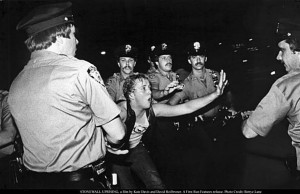LGBT History Month: A Movement of Survival
 Photo by Bettye Lane
Photo by Bettye Lane October is LGBT History Month. While we celebrate the many LGBTQ activists and allies who helped create a world where people like me can build families in the US with less fear than at any time in our history, let us also remember how we LGBTQ people came to be characterized this way.
There are many illusions that make it possible for our society to function as it does. We’ve created many categories and identity checkboxes over time, all of them which serve to make some seem lesser than others. I have been writing and thinking for years about my own experiences with being “other-ed.” I am gay today, not because of some undeniable and true fact about my innermost self—I am gay today because straight people created this box for me. In fact, they created the straight box for themselves as well. These categories weren’t made to help me—they were created to criminalize and pathologize my behavior.
Hanne Blank writes in Straight: The Surprisingly Short History of Heterosexuality that it has “only been possible to be a heterosexual since 1869. Prior to that time, men and women got married, had sex, had children, formed families, and sometimes even fell in love, but they were categorically not heterosexuals.” That category of person didn’t exist yet. Blank goes on to argue that the concepts of heterosexual and homosexual didn’t represent a new understanding of something that had always been true—Blank argues (and I agree) that these ideas succeed because they were in fact useful. They codified what was “normal” and what was less than normal. The terms “heterosexual” and “homosexual” were first coined in writing on May 6, 1868 by Karl Maria Kertbeny who was working to change laws in Germany that made sex between men illegal. More than a hundred years later, in December 1973, the American Psychiatric Association voted to eliminate homosexuality as a “sexual deviation” and replaced it with “sexual orientation disturbance” in the DSM-II. It took several more decades to continue to de-pathologize this created category of humans to which I belong.
The LGBTQ movement today did not start out full of pride and in efforts for equal rights. Our history is one of survival. We may not have asked to be a community, but we have created one, or many, out of what was put upon us. In another time, and still in other places today, loving my husband was and is a criminal act. We have long been forced to fight for spaces, first to survive and then in which to live. Now that is something to be prideful of and something I am proud to claim as part of my history and identity.
It’s important to remember that we were once designated as sexual criminals and targeted by psychologist and state-sanctioned brutality. If we forget, too soon we have media creators erasing our real heroes and heroines, such as Marsha P. Johnson, Miss Major Griffin-Gracie and Sylvia Rivera, who began our modern LGBTQ rights movement with a riot at the Stonewall Bar in New York City.
Greta Christina shared this remark during her 2013 LGBT Humanist of the Year acceptance speech:
A lot of our PR in the godless movement—just like a lot of PR in the LGBT movement—is focused on how we’re just like everyone else. We’re your neighbors, your friends, your colleagues, your family—and we’re just like you, except for the part where we don’t believe in God. Or, in the case of gay people, except for the part where we like gay sex.…I think [humanists] do see things like death, suffering, the meaning of life, in some ways that are pretty profoundly different from religious people. Just like being queer generally means you see things like gender and gender roles, sexuality, what it means to be a family, rather differently from mainstream straight society…What [humanists] need isn’t always going to be exactly what [the religious] need. And I think that this will be true, even as we become more mainstream. I think we can look at what religion offers people, without trying to duplicate exactly what they’re doing, just with the God taken out.
We cannot let becoming more acceptable equal forgetting about our troubling past. Our history is not a completely happy one. Many horrible things have happened to make us who we are today. It’s also important to remember that we are still here, we are creating community, and we are changing the world in spite of all that has come before. Despite whether I had a say in the creation of the category or not, I am gay, I am proud, and I remember those who fought and continue to fight for the equality of my identity.
